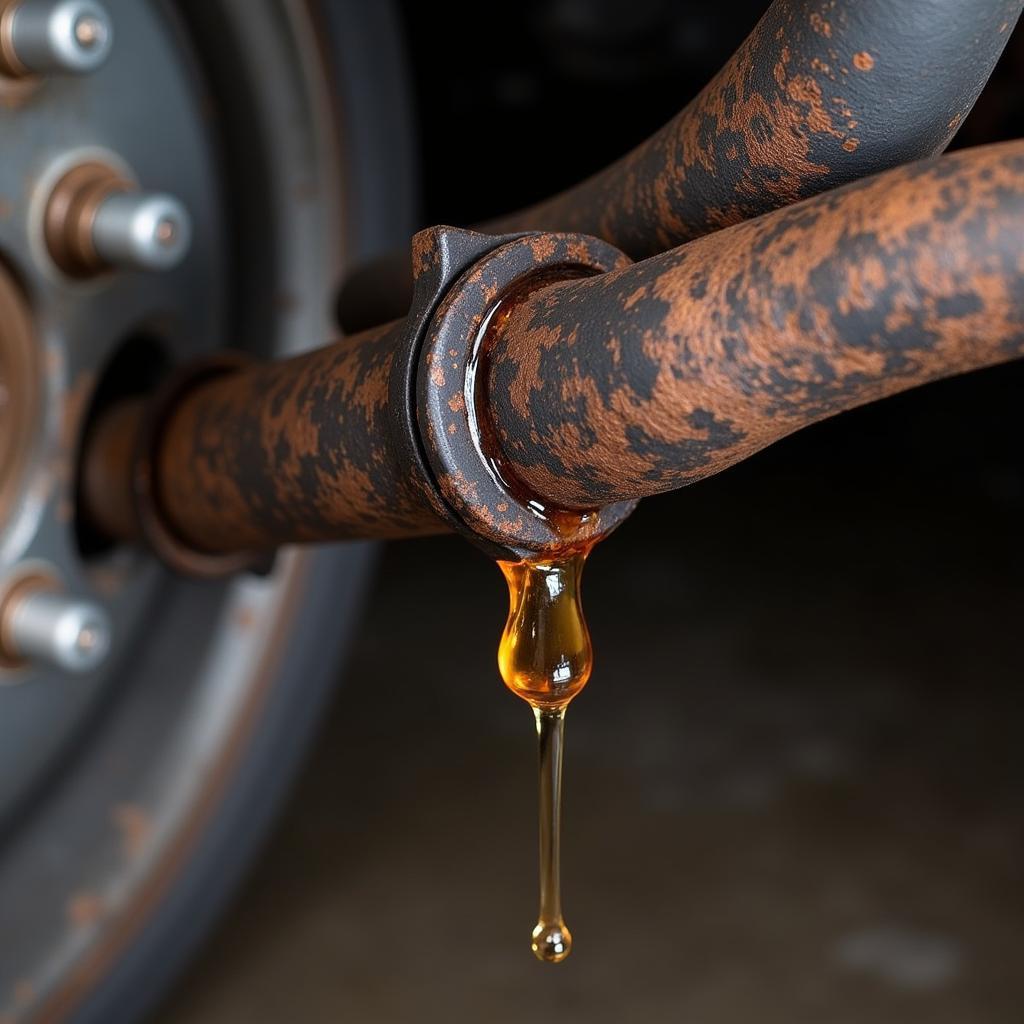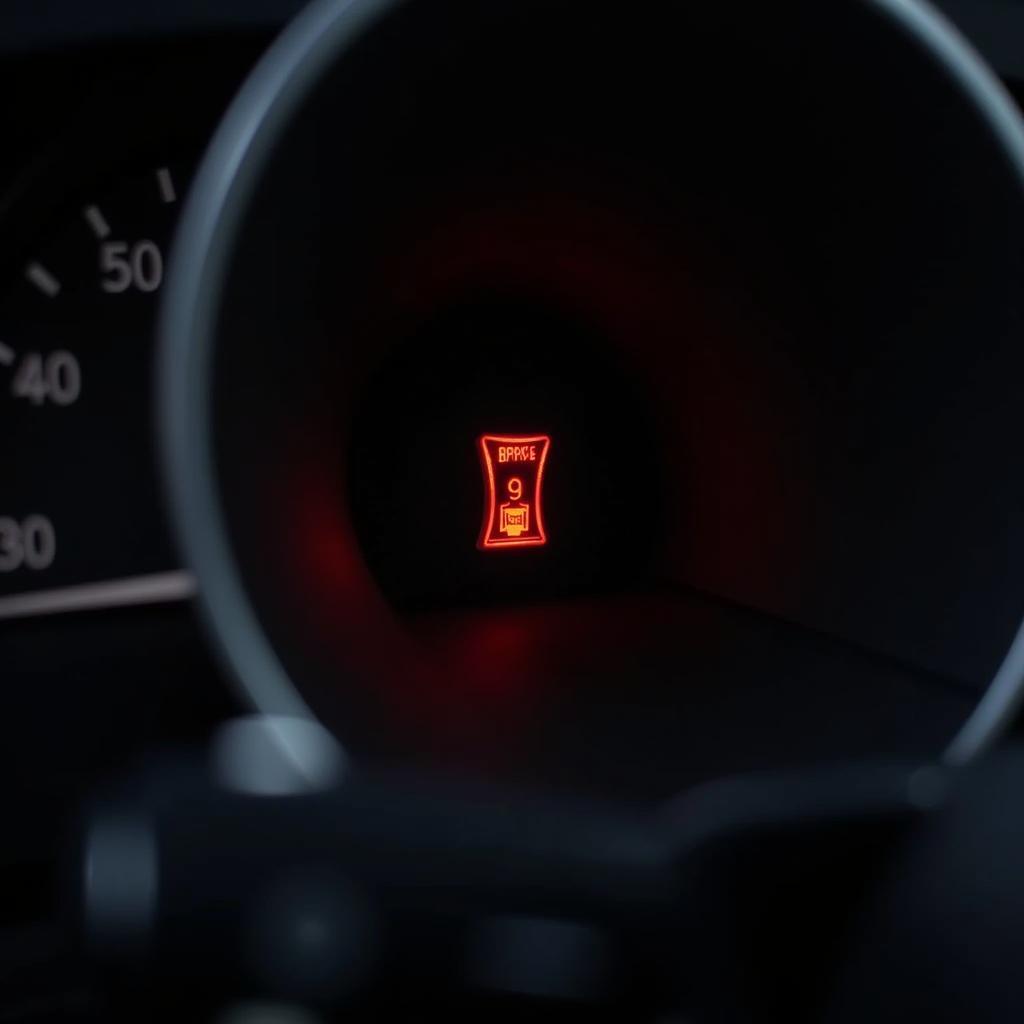The terrifying thought of your brakes failing without warning is enough to make any driver nervous. While modern vehicles are equipped with advanced safety features, brake failure can still occur. The good news is that complete brake failure is rare, but it’s crucial to understand the potential causes and warning signs to ensure your safety on the road.
What Causes Brakes to Fail Suddenly?
While many factors contribute to brake wear and tear, some can lead to sudden failure:
- Brake Fluid Leaks: Brake fluid is the lifeblood of your braking system, transmitting the force from your foot to the brakes. Leaks in the brake lines, hoses, or calipers can significantly reduce braking power, leading to a soft or spongy brake pedal feel.
- Worn Brake Pads and Rotors: Brake pads and rotors are designed to wear down over time. However, driving with severely worn pads can result in metal-on-metal contact, causing grinding noises, vibrations, and significantly reduced braking effectiveness.
- Hydraulic System Failure: The hydraulic system multiplies the force applied to the brake pedal, allowing you to stop your vehicle effectively. Any issues within this system, like a malfunctioning master cylinder, can lead to a loss of pressure and brake failure.
- Overheated Brakes: Continuous hard braking, especially when descending steep hills, can generate excessive heat, causing brake fade. This temporary loss of braking power occurs when brake components become too hot and can’t grip properly.
- Faulty ABS System: While designed to prevent wheel lockup, a malfunctioning Anti-lock Braking System (ABS) can interfere with normal braking operation. If the ABS control module fails or sensors malfunction, it can lead to unexpected braking behavior.
 Brake fluid leaking from a car's brake line
Brake fluid leaking from a car's brake line
Recognizing the Warning Signs of Brake Failure
Early detection is crucial to prevent a dangerous situation. Be vigilant and watch for these warning signs:
- Illuminated Brake Warning Light: This light on your dashboard is often the first indicator of a brake problem. It could signal low brake fluid, worn brake pads, or a fault within the ABS system.
- Spongy or Soft Brake Pedal: If the brake pedal feels soft, sinks to the floor, or requires more pressure than usual to stop, it indicates a loss of hydraulic pressure, potentially due to a leak or air in the lines.
- Grinding or Squealing Noises: A high-pitched squealing noise usually indicates worn brake pads. However, a grinding metal-on-metal sound suggests severely worn pads or other serious brake component damage.
- Pulling to One Side When Braking: If your vehicle veers to one side when applying the brakes, it could indicate uneven brake pad wear, a stuck caliper, or a problem with the hydraulic system on one side.
- Burning Smell While Driving: A strong, acrid odor coming from your wheels, especially after prolonged braking, could signal overheated brakes.
 Red brake warning light illuminated on a car dashboard
Red brake warning light illuminated on a car dashboard
What to Do If Your Brakes Fail
Experiencing brake failure can be terrifying, but staying calm and reacting swiftly is essential. Here’s what to do:
- Don’t Panic: Stay calm and focus on regaining control of your vehicle.
- Pump the Brakes: If you experience a soft brake pedal, pump the brakes rapidly several times. This may help build up enough pressure to slow down or stop.
- Downshift to a Lower Gear: Shifting to a lower gear helps slow the vehicle using engine braking, particularly effective on downhill slopes.
- Apply the Parking Brake Gradually: Engage the parking brake slowly and steadily, avoiding a sudden jerk that could lock up the rear wheels and cause a skid.
- Steer to Safety: Remain aware of your surroundings and steer clear of obstacles and other vehicles. Aim for a safe stopping point like a shoulder, an open field, or a runaway truck ramp if available.
- Once Stopped, Turn on Hazard Lights and Call for Help: After coming to a complete stop, turn on your hazard lights and call for roadside assistance immediately.
Preventing Brake Failure: Regular Maintenance is Key
Preventing brake failure largely depends on proactive maintenance:
- Regular Brake Inspections: Have your brakes inspected by a qualified mechanic at least once a year or as recommended by your vehicle manufacturer.
- Timely Brake Pad Replacement: Replace brake pads before they wear down completely.
- Brake Fluid Flush: Flush and replace your brake fluid every 2-3 years or as recommended by your owner’s manual.
- Inspect Brake Lines and Hoses: Regularly inspect brake lines and hoses for cracks, leaks, or damage, especially in older vehicles.
- Listen to Your Brakes: Pay attention to unusual noises, vibrations, or changes in brake pedal feel.
“Ignoring the warning signs of brake problems is like playing Russian roulette with your safety,” says Jake Miller, a seasoned automotive engineer with over 20 years of experience. “Regular maintenance and timely repairs are non-negotiable when it comes to brakes.”
FAQs about Brake Failure:
Can brakes fail completely without warning?
While rare, complete brake failure can occur due to catastrophic component failure or a sudden loss of brake fluid. However, most brake failures give warning signs.
How long do brakes usually last?
Brake pad and rotor lifespan varies greatly depending on driving style, vehicle type, and driving conditions. However, a general guideline is 30,000 to 70,000 miles.
Can I drive with the brake warning light on?
Driving with the brake warning light illuminated is highly discouraged as it signals a potential issue with your braking system. Have your vehicle inspected by a professional immediately.
Is it normal for my brakes to smell after driving downhill?
Some brake smell after prolonged downhill driving is normal due to heat buildup. However, if the smell is strong, acrid, or accompanied by other symptoms like grinding, it warrants immediate attention.
Can I fix my brakes myself?
Unless you have advanced mechanical skills and experience, it’s best to leave brake repairs to qualified mechanics. Brakes are a critical safety system, and improper repairs can have dangerous consequences.
Conclusion
While the possibility of brake failure is a real concern, understanding the causes, recognizing warning signs, and practicing preventive maintenance significantly reduce the risk. Remember, your brakes are your vehicle’s most crucial safety feature. Never ignore warning signs, and schedule regular inspections to ensure your safety and peace of mind on the road. For drivers experiencing warning light issues, resources like those found on how do i fix my brake warning light can provide further guidance and support.
